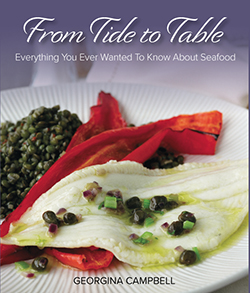An Irish Chef in France
Euro-Toques chef Martin Dwyer and his wife Sile, formerly of the much-loved Dwyers restaurant in Waterford, now live in the Languedoc, where they take guests - and feed them very well.
This month: What It Really Takes To Run A Restaurant
As I write this it is the beginning of May in 2020 and restaurants in France where I live have been closed since the middle of March. Some staggered openings of other businesses have now been announced here, but there is very little hope of restaurants re-opening before the end of June at the earliest.
The tourists to the Languedoc come mainly for the beaches and they have also been closed down so even if restaurants were permitted to open their doors customers would be in scarce supply.
This is very bad news for restaurants.
 I have spent most of my working life in Ireland working in restaurants - as a chef and also, latterly, as a proprietor. I can now imagine the despair which my fellow restaurateurs must be feeling. It is a very difficult business to survive in; one slack night in an otherwise busy week can be nerve wracking, so a whole three months must be devastating.
I have spent most of my working life in Ireland working in restaurants - as a chef and also, latterly, as a proprietor. I can now imagine the despair which my fellow restaurateurs must be feeling. It is a very difficult business to survive in; one slack night in an otherwise busy week can be nerve wracking, so a whole three months must be devastating.
I think there is a general impression that restaurants can be run successfully by talented amateurs. I couldn’t count the amount of times a satisfied customer has, at the end of a good meal, confided that he and his wife have often thought of opening a place where they could feed the public.
Now I know people think that being a good cook is enough skills to run a successful restaurant, but people need to know that there are a lot of other skills to practise if they want to remain in business.
You must be a good accountant - if you are not charging enough money to cover all your expenses and costs, you will not remain long in business.
On the other side of the coin, if you charge too much you will be perceived as rip off and the customers will also stay away.
You must also be an expert in human resources, in restaurants there is inevitably a large time spent when staff have to work well together as a team, if it seems to one member that another is not pulling his weight then trouble ensues. Perhaps a waiter is required to help out with desserts or (as is currently in vogue), a chef might be needed to bring food to a table. You as proprietor must create an ethos where people are prepared to move, when needed, between roles for the good of the business.
There’s a multitude of other little skills in which you must be practised if your business is to be successful.
You must have a natural eye for décor and style because if your dining room doesn’t look pristine and welcoming no amount of good food will persuade your customers to return. You must be able to pass through the room and spot and rectify the smudge on a glass or the grains of salt on a table and yes, you must learn how to properly arrange flowers in a vase.
The point I am making here is that restaurateurs are in fact highly skilled individuals and as such should be nurtured rather than hindered by laws and taxes which don’t help their businesses.
We are all aware now that the industry has been finding it extremely difficult to recruit workers, and particularly chefs for restaurants. The reason of course is both pay and conditions and the only way that restaurateurs will be able to fix this is either to pay out less in taxes, to charge more at the end of a meal, or to somehow reduce their costs so that, while charging the same money they can pay less for their raw product.
 We have a small restaurant in our village here in France and they are keeping in touch with us, their customers, while in lockdown. They have told us that when they re-open they are going to serve more “small plate” food, that will make their offering more casual with a repertoire more like tapas. This is becoming an attractive option for restaurants and many fine dining chefs are deciding to change course in a bid to offer quality midmarket food in a less intense working environment. Among them, I see that my old friends Derry and Sallyanne Clarke have decided to move from Dublin’s famed L‘Ecrivain at the end of the year and reopen in Temple Bar as a restaurant that serves cheaper and less labour intensive food. This may well be the way forward.
We have a small restaurant in our village here in France and they are keeping in touch with us, their customers, while in lockdown. They have told us that when they re-open they are going to serve more “small plate” food, that will make their offering more casual with a repertoire more like tapas. This is becoming an attractive option for restaurants and many fine dining chefs are deciding to change course in a bid to offer quality midmarket food in a less intense working environment. Among them, I see that my old friends Derry and Sallyanne Clarke have decided to move from Dublin’s famed L‘Ecrivain at the end of the year and reopen in Temple Bar as a restaurant that serves cheaper and less labour intensive food. This may well be the way forward.
Meanwhile, whatever the style of their offering, there is no doubt that this virus is dealing a terrible blow to all my friends in the industry - so we must all try and support them enthusiastically as soon as they are allowed to reopen their doors.
Martin Dwyer started cooking professionally over 40 years ago in the legendary “Snaffles Restaurant” in Dublin. After a time in a Relais Chateau in Anjou and in “The Wife of Bath” in Kent he opened his own acclaimed restaurant, “Dwyers”, in Waterford in 1989. In 2004 he sold this and moved south to France where he and his wife Síle bought and restored an old presbytery in a village in the Languedoc. They now run Le Presbytère as a French style Chambre d’Hôte. Martin however is far too passionate about food to give up cooking so they now enjoy serving dinner to their customers on the terrace of Le Presbytère on warm summer evenings. Martin runs occasional cookery courses in Le Presbytère and Síle’s brother Colm does week long Nature Strolls discovering the Flora and Fauna of the Languedoc.
Le Presbytère can be seen at: www.lepresbytere.net;
email: martin@lepresbytere.net.






There are currently no comments
Leave a comment
Not a member? Register for your free membership now!
Or leave a comment by logging in with: